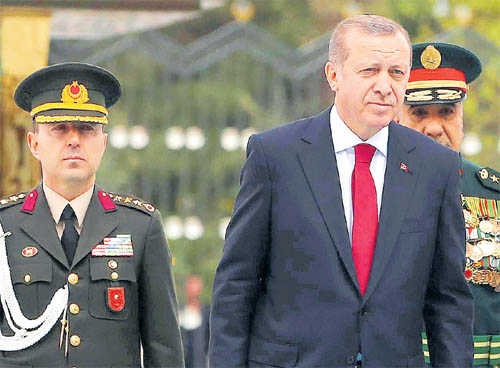
Powered up: Erdogan is unapologetic about his overreaching ambitions.
THANKS to Turkey’s key position in a turbulent region and help to stem the flow of refugees to Europe for a price, the world’s capitals are responding cautiously to President Recep Tayip Erdogan’s moves to detain thousands and propose giving himself all powers over the military and civilian fields. He has publicly declared that it is an opportunity given by God and he is exploiting it to the hilt.The coup of July 15 initiated by a section of the armed forces, which fizzled out quickly with political parties and the public condemning it, has culminated in a wholesale cleansing of the armed forces, including many generals and admirals, and the civilian and judicial power structures. The state’s enemies now are the Gulenists, followers of Fetullah Gulen, a self-exiled cleric living in America being charged with instigating the coup. Here we must explain the peculiarities of the Turkish legacy. Ataturk, the builder of modern Turkey on the ruins of the Ottoman Empire, left a transformed country, abolishing the symbols of religious beliefs and practices to the extent of changing the written script to Roman characters. But he left behind a tradition of the army assuming state power and Turkish history is littered with a succession of coups carried out in recent times by the armed forces underlining the military being the main power centre. Mr Erdogan entered the political arena as a religion-flaunting mayor of Istanbul. He was imprisoned briefly for flaunting his religious card. But he and his colleagues were mining the religious constituency for his Justice and Development Party (AKP) and as his party’s fortunes progressed, he sought the help of Gulen and his “service” movement to create conditions in which the military could no longer pose a threat to the civilian dispensation. In his earlier avatar as prime minister, Mr Erdogan had presented himself as a moderniser making determined moves to seek membership of the EU and undertook legislative measures to comply with its norms and started negotiations with the militant Kurdish party, the PKK, to try to end the longstanding insurgency. There was resistance in the EU (the European Economic Community as it then was) to absorbing millions of Muslims into the community. It is still not clear what made Mr Erdogan change direction. But the demands of his main community, the upworldly mobile religiously-observant new middle class in Anatolia, were very different. Even as the Gulenists helped Mr Erdogan in making the country safe from coups, it came at the cost of Gulenists becoming a force by infiltrating the ranks of the armed forces and the civil and judicial services. The marriage between the AKP and the Gulenists lasted till Mr Gulen discovered that Mr Erdogan had his own agenda of assuming total power. He had sought exile in the US earlier. In 2013, Gulenists named senior members of the Turkish cabinet and Erdogan’s family members in serious corruption charges. The war between the two sides was on, with Ankara now demanding Mr Gulen’s extradition from the US. Mr Erdogan’s own ambitions grew exponentially. After being elected and re-elected prime minister, he declared his intention to change the constitution to convert the system into an executive presidency. While in search of a two-thirds majority in Parliament, despite relatively poor showing in two elections, he resigned to run for presidency through an election he won. Although Mr Erdogan has still to secure a constitutional amendment, he runs the country in practice having appointed a more pliant prime minister. The present situation is full of ironies. His hero Ataturk pulled the country out of its fall by confining religious practices to the dustbin. By contrast, Mr Erdogan is seeking to re-emphasise religion, giving primacy to headscarves for women and observing other Muslim conventions to please his main domestic constituency and remain in power. Yet Turkey remains a key player in the Middle East because of its location, its military strength and the state of other countries in the region. Until recently, it was the main conduit for an army of jihadists fighting in the Syrian civil war. Its stricter control of borders came after American and Western pleading, as was its belated decision to let the US and allied aircraft use the Incirlik air base for bombing IS targets. A number of bombing incidents in Turkey are believed to be expressions of IS anger over Ankara’s policy change. Turkey has resumed its war with the Kurdish PKK in the south-east of the country in particular. The picture is further complicated by the Syrian Kurds being the best ground fighters in the American effort to get the better of the IS. And Russian intervention in the Syrian civil war through supporting the Assad regime mainly by air power gives a further loop to something of an East-West struggle.The most serious consequence of recent developments in Turkey is that a country that was supposed to be a stabiliser in a maddeningly disturbed area has itself become a cause for concern as Mr Erdogan seeks total supremacy over all his combined political foes. His goal is nothing short of constructing a new Ottoman dispensation even as he subverts the essence of the Ataturk revolution.Turkey is hosting millions of Syrian refugees, as are its neighbours. Americans’, and the world’s, attempts to end the Syrian civil war have stumbled, with Russia now a new party to be consulted, as the US realises, despite the Obama administration’s antipathy to Moscow. How Ankara can help this process remains doubtful, apart from Mr Erdogan’s efforts to unseat Syrian President Bashar al-Assad. Clearly, the Turkish ruler’s attention will be devoted in a greater measure to his domestic problems.America’s contest with the IS will continue, with bombing runs now extended to Libya with its different armed centres of power fighting the recognised coalition. The Obama administration is leaving it to the next President to frame a new policy for the Middle East and the world.
